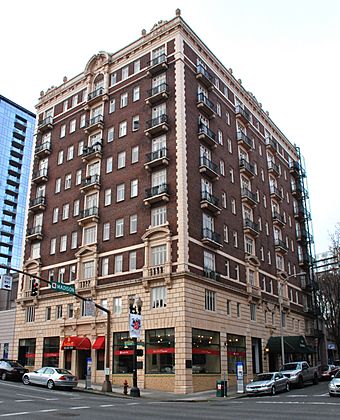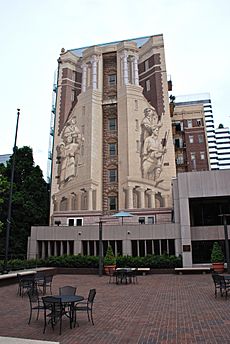Sovereign Hotel (Portland, Oregon) facts for kids
Quick facts for kids |
|
|
Sovereign Hotel
|
|

The former Sovereign Hotel on Broadway
|
|
| Lua error in Module:Location_map at line 416: Malformed coordinates value. | |
| Location | 710–716 SW Madison Street Portland, Oregon |
|---|---|
| Area | less than one acre |
| Built | 1923 |
| Architect | Carl L. Linde |
| Architectural style | Georgian Revival |
| Website | https://sovereignpdx.com/ |
| NRHP reference No. | 81000520 |
| Added to NRHP | December 2, 1981 |
The Sovereign Hotel was a tall, nine-story building in Portland, Oregon. It was built in 1923 as a hotel. Later, it became a special historic place. On December 2, 1981, it was added to the National Register of Historic Places. This means it's an important building in U.S. history. Today, part of the building is home to the Oregon History Center.
Building History
The Sovereign Hotel was designed by an architect named Carl L. Linde. Its style is called Georgian Revival. At one time, it was also known as the Sovereign Apartments.
In September 1926, a radio station called KFWV moved into the hotel. This station later became known as KWJJ. However, KFWV moved its studios again in March 1927.
A person named Harry Mittleman bought the hotel in 1938. He was known for building many apartment buildings in Portland. Soon after buying it, he changed the Sovereign into apartments. Mittleman sold the building in 1972.
Art on the Walls
In 1982, the Oregon Historical Society (OHS) bought the building. They wanted to make their Oregon History Center bigger. The building has a unique L-shape with six sides.
In 1989, a famous artist named Richard Haas painted murals on four of these sides. Two of these murals are very tall, reaching eight stories high! The OHS asked him to create these artworks.
One mural shows the famous Lewis and Clark Expedition. This was a journey of exploration across America. Another mural on the south side shows the pioneer period in Oregon's past. It tells the story of early settlers.
Recent Changes
The Oregon Historical Society sold the building in 2014. A special rule was part of the sale. The new owner had to promise to keep Richard Haas's murals safe.
In early 2016, the building began to be updated. The work was expected to finish in the fall of 2016.
 | Kyle Baker |
 | Joseph Yoakum |
 | Laura Wheeler Waring |
 | Henry Ossawa Tanner |


